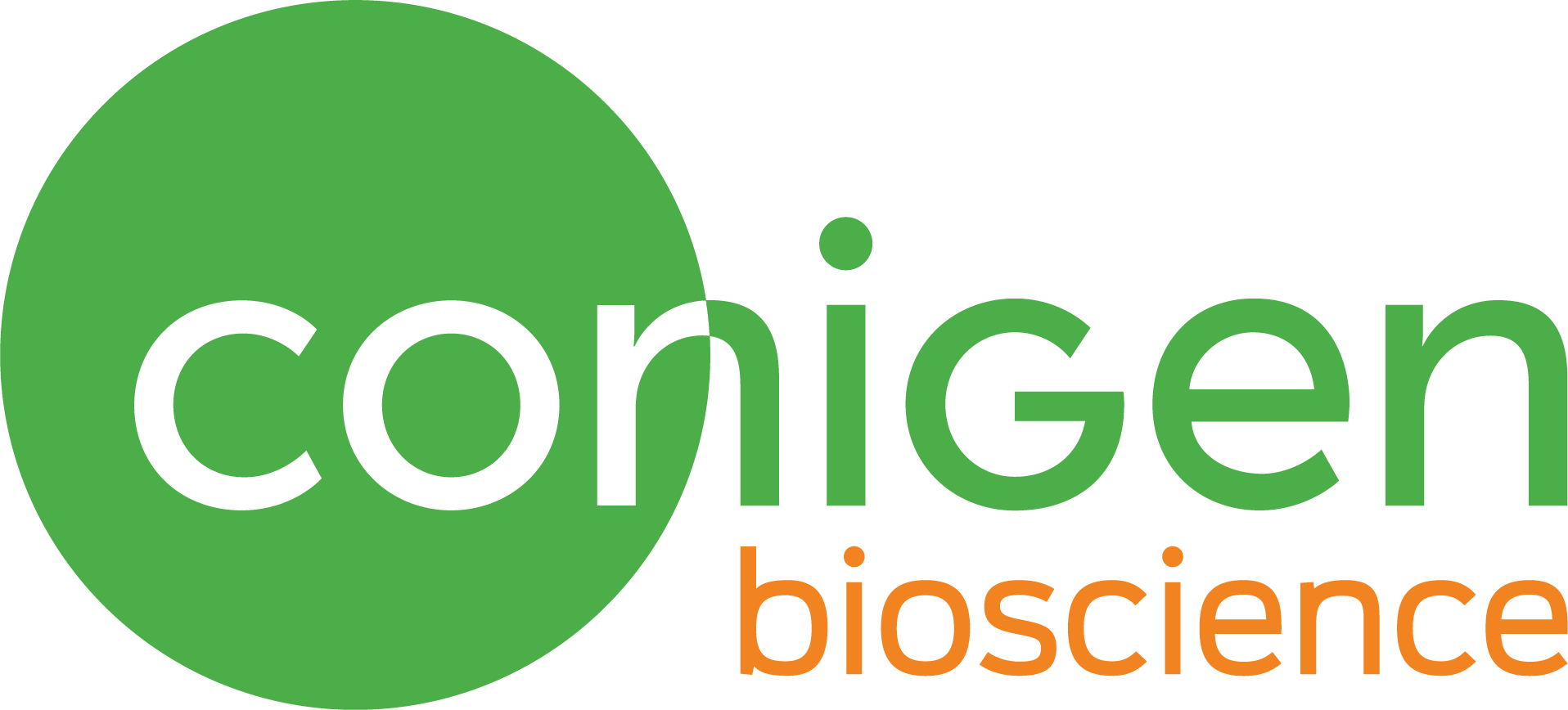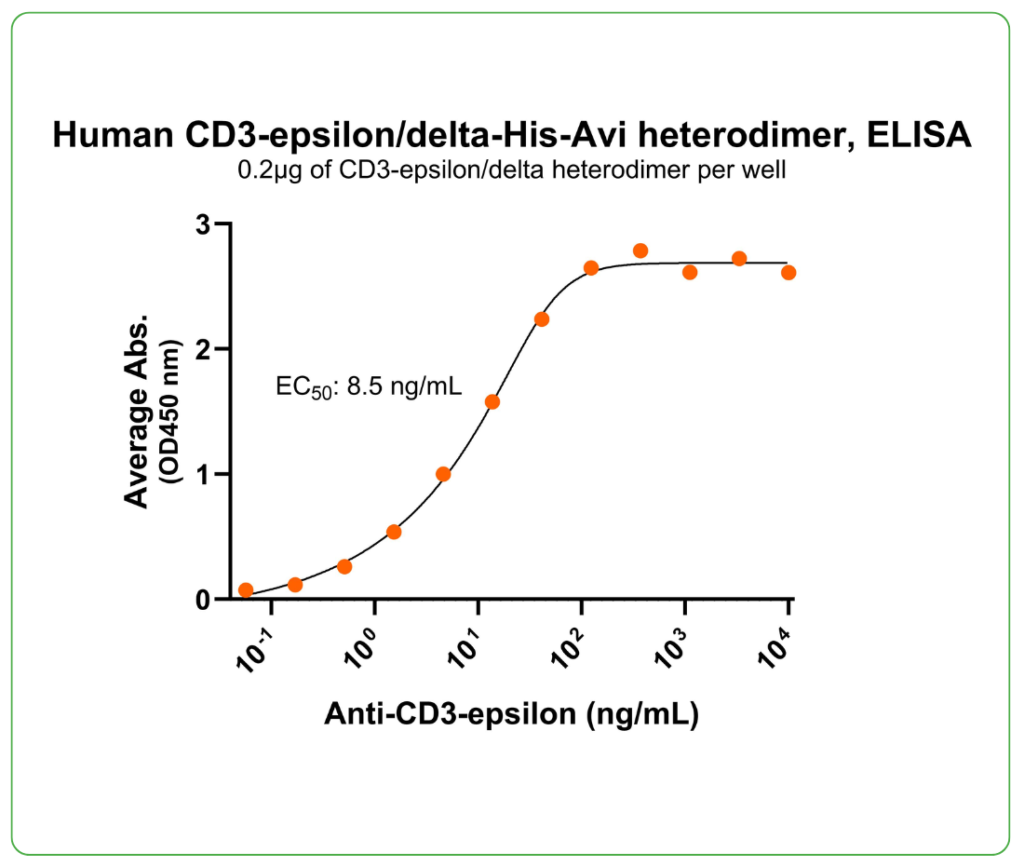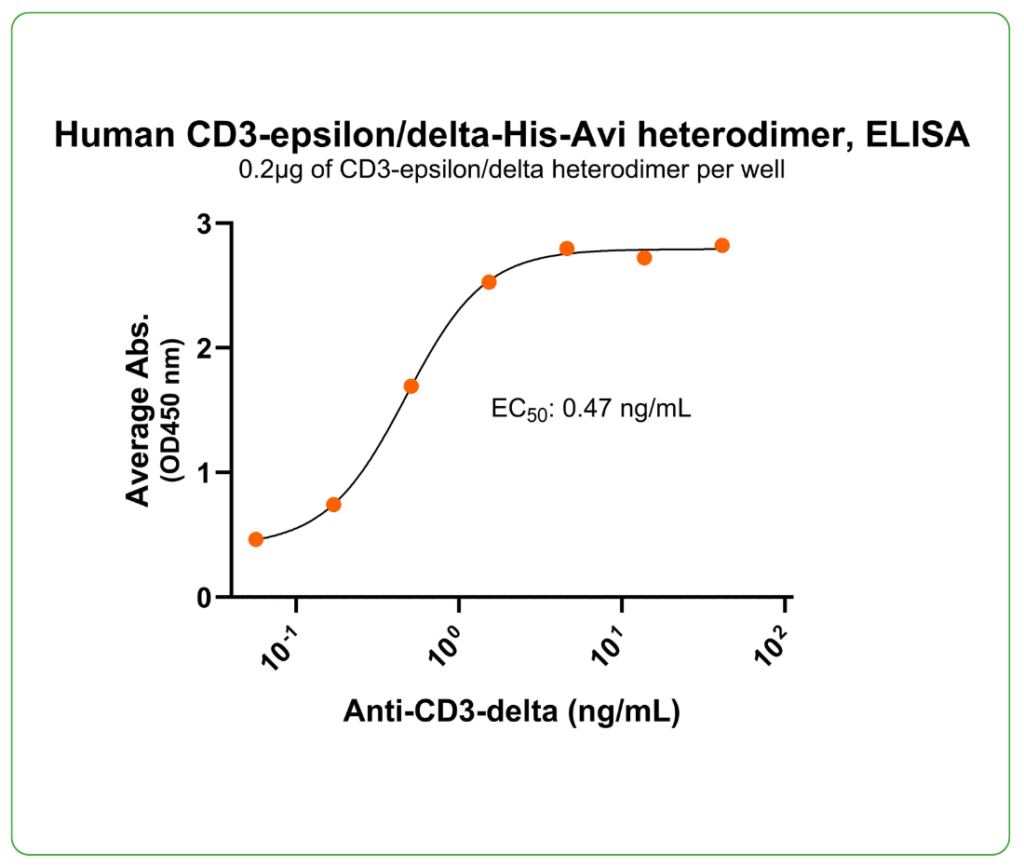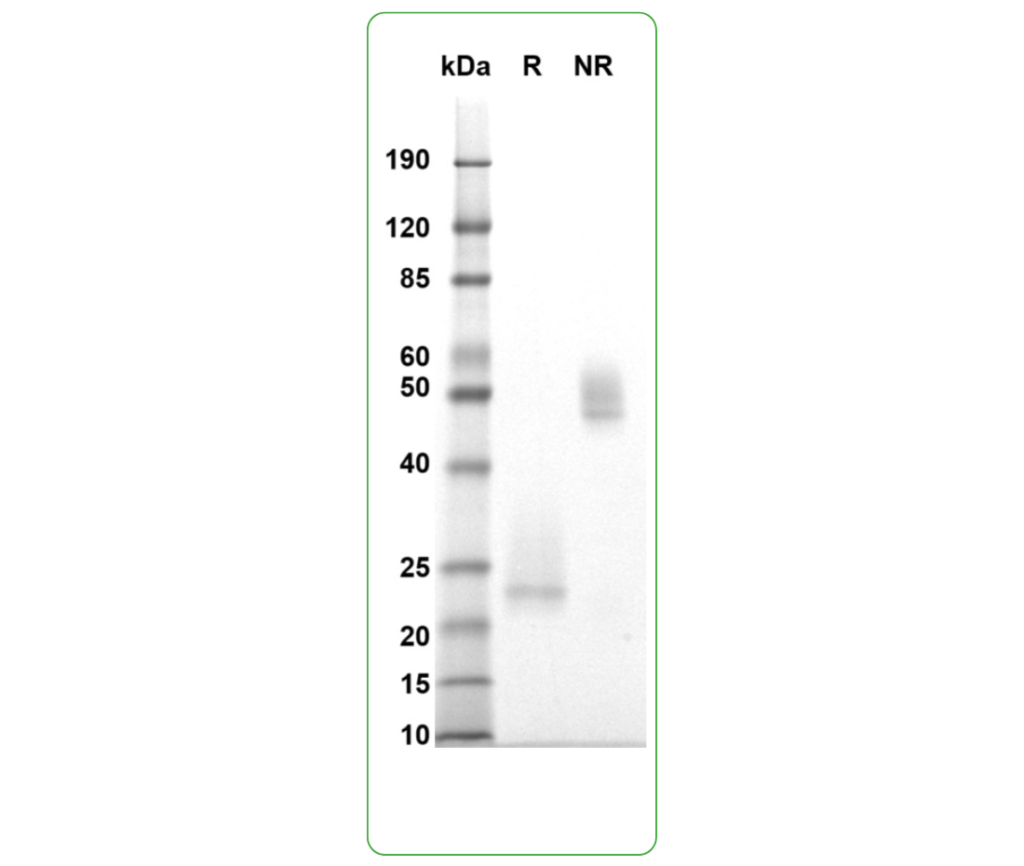Human CD3-epsilon/delta Heterodimer, His-Avi Tag
| Product Code | CSP-24043-A1B5 |
| Expression Host | HEK293T |
| Verified Applications | ELISA for CD3-epsilon-specific and CD3-delta-specific antibody binding assays. |
| Suggested Applications | SPR & BLI for CD3-epsilon-specific antibodies and CD3-delta-specific antibodies. Animal immunization, RUO. |
| Purity | Greater than 90% dimer form as determined by SDS-PAGE under non-reducing condition |
| Amino Acid Range | D23-D126 ; F22-A105 |
For Research Use Only (RUO)
Price: $125.00
Price: $195.00
Price: $350.00
Price: $1,050.00
Price: $3,500.00
Bioactivity – Antibody Binding
Immobilized human CD3-epsilon/delta protein dimer, His-Avi Tag (Cat. No. CSP-24043-A1B5) at 2 μg/mL (100 μL/well) can bind anti-human CD3-epsilon monoclonal antibody, with half maximal effective concentration (EC50) range of 4.2-16.9 ng/mL (QC tested).
Bioactivity – Antibody Binding
Immobilized human CD3-epsilon/delta protein dimer, His-Avi Tag (Cat. No. CSP-24043-A1B5) at 2 μg/mL (100 μL/well) can bind anti-human CD3-delta monoclonal antibody, with half maximal effective concentration (EC50) range of 0.2-0.9 ng/mL (QC tested).
Specifications
Formulation: 0.22μm filtered PBS, pH 7.4
Shipping: Frozen Dry Ice
Storage: -80°C
Human cluster of differentiation 3 (CD3) epsilon/delta (CD3δε, CD3-epsilon/delta) heterodimer is a component of the T cell receptor (TCR) that is involved in activating both the cytotoxic T cell and T helper cells. The recombinant CD3-epsilon/delta protein (CSP-24043-A1B5) is a heterodimer and contains a CD3-epsilon extracellular domain (UniProt# P07766, amino acids Asp23-Asp126) and a CD3-delta extracellular domain (UniProt# P04234, amino acids Phe22-Ala105) fused with a proprietary cis-dimer motif followed by a His-tag at the epsilon C-terminus and an Avi-tag at the delta C-terminus. This heterodimeric protein is expressed in HEK293T cells. The recombinant human CD3-epsilon/delta protein heterodimer is bioactive and can bind to both CD3-epsilon and CD3-delta-specific antibodies. This CD3-epsilon/delta heterodimer can be used as an antigen for in vitro assays and antibody screening, and as an immunogen for immunization to generate antibodies targeting more conformational epitopes.
Protein Name: CD3-epsilon/delta
UniProt #: P07766 ; BA: P04234
Predicted Molecular Weight: 38 kDa
SDS PAGE Molecular Weight: The migration range of the heterodimer epsilon chain and delta chain under reducing conditions are 20-25 kDa. The migration range of the heterodimer under non-reducing conditions is 40-60 kDa on SDS PAGE.
Protein Construct: CD3-epsilon/delta protein heterodimer contains a CD3-epsilon extracellular domain (UniProt# P07766, amino acids Asp23-Asp126) and a CD3-delta extracellular domain (UniProt# P04234, amino acids Phe22-Ala105) fused with a proprietary cis-dimer motif followed by a His-tag at the epsilon C-terminus and an Avi-tag at the delta C-terminus.
Background
Human cluster of differentiation 3 (CD3) epsilon/delta (CD3δε, CD3-epsilon/delta) heterodimer contains CD3-epsilon and CD3-delta within the CD3 complex. CD3 complex is a crucial part of the T cell receptor (TCR). CD3-epsilon and CD3-delta are Type I transmembrane proteins and members of the immunoglobulin superfamily. CD3-epsilon and CD3-delta each contain an extracellular domain composed of an immunoglobulin domain followed by a short a membrane-proximal connecting peptide, a transmembrane domain, and an intracellular domain. CD3-epsilon/delta together with CD3-epsilon/gamma heterodimer, T-cell receptor-alpha/beta (TCR), and CD3-zeta homodimer make up the TCR complex. CD3 can act as a marker antigen due to its presence in almost all T-cell lymphomas and leukemias and can be used to distinguish them from other cancers. Because CD3 is required for T-cell activation, it has become an important target for developing cancer therapeutics, as well as immunosuppressant therapies for type 1 diabetes and other autoimmune diseases. In the T cell receptor, CD3-epsilon/delta is responsible for transmitting activation signals when the TCR recognizes an antigen and is involved in activating both the cytotoxic T cell and T helper cells. Therefore, a recombinant CD3-epsilon/delta protein heterodimer mimicking the CD3-epsilon/delta heterodimer native conformation can be critical for target for drug discovery and immunotherapy research.
Alternate Names: CD3D, CD3-delta, IMD19, T3D, CD3d molecule, CD3 delta subunit of T-cell receptor complex, CD3delta, CD3δ, CD3E, IMD18, T3E, TCRE, CD3ε, CD3e molecule, CD3-epsilon, CD3 epsilon subunit of T-cell receptor complex



